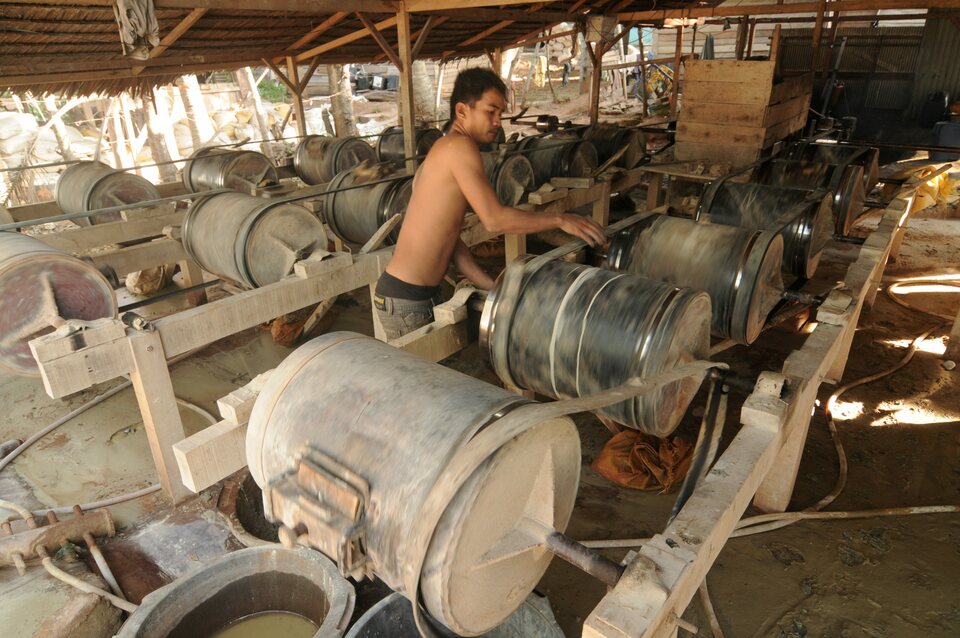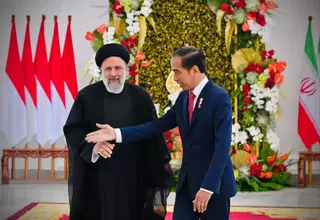Mercury in Mining a Toxic 'Time Bomb' for Indonesia

Cisitu, Banten. Inside a dusty, cupboard-sized workshop in the remote mountains of western Java, Ateng spells out the toxic mix he uses to produce gold.
“I used 300 grams of mercury, in five ball mills, for two sacks of ore,” the 25-year-old says, flicking a blowtorch alight and taking aim at the amalgam of gold ore and mercury in front of him.
It’s a familiar calculation for Ateng, and one that in some form or another has been utilized for centuries — using mercury, a highly toxic liquid metal, to extract gold from ore.
But here in Cisitu, a gold mining village deep in Gunung Halimun National Park, medical experts and environmental campaigners believe it could be the cause of a rash of illnesses among residents.
Rice fields and fishponds have been poisoned, environmental testing has found, and some residents are showing signs of severe mercury intoxication.
What’s more worrying to campaigners like Yuyun Ismawati, a Goldman Prize-winning environmental engineer and senior adviser at BaliFokus, is that a similar situation is being played out at hundreds of mining hot spots across Indonesia.
“You cannot see it now, but the cost of inaction could be huge,” says Ismawati, an Indonesian now based in the United Kingdom.
The use of mercury, which helps extract gold from chunks of ore by creating an amalgam, is widespread among artisanal gold miners in Indonesia.
The small-scale gold mining sector is now believed to employ more than one million people in hundreds of mining hotspots across the country. It also contributed about 57 percent of Indonesia’s total mercury emissions in 2012, according to researchers.
Most of the operations are illegal, backed by a cast of corrupt officials, military, police and invisible financiers, says Ismawati, who recently received a US State Department grant to study the mercury trade.
For impoverished regions, small-scale gold mining has provided quick cash, new motorbikes and modest homes, but it’s come with irreversible affects to the environment.
Gaseous mercury is released into the air during purification, and waste material leaches into soil, drains into rice paddies, fishponds and the ocean. From there it can find its way into the food chain.
Nowhere is this clearer than Cisitu, a town of about 7,000 people in Banten province, roughly eight hours’ drive from Jakarta.
To reach it from the next town with dependable cell phone reception visitors have to drive at least two hours along muddy and rutted roads, up and over a series of jungle-clad peaks.
Nestled on the floor of a valley and surrounded by terraced rice fields, at a glance it’s idyllic. But air and food samples tell another story.
The average mercury concentration in the air is close to 10 times higher than World Health Organization guidelines, according to 2012 samples taken by BaliFokus.
In some sample areas, mercury concentration is more than 50 times higher.
Stored rice — the staple food in the village —was found to have methyl-mercury levels up to 10 times higher than WHO recommendations.
“It’s not only that they pollute the environment in general, they consume the environment,” says Dr. Stephen Bose-O’Reilly, a German expert on the health impacts of mercury, who has visited the area multiple times. “They pollute the fishponds and rice fields.”
In October last year, 18 villagers from Cisitu were assessed by a medical team led by Dr. Jossep Frederick William of the Medicuss Foundation.
All but three were judged to be intoxicated with mercury, showing typical symptoms such as involuntary trembling and shaking of limbs, coordination problems and ataxia.
Hair and urine samples also showed elevated mercury levels, a recently released report says.
Despite a relatively small sample size, the results are enough to warrant a more comprehensive testing and immediate health care, say Bose-O’Reilly and Ismawati.
That’s something village chief Abah welcomes. He says Cisitu has been “waiting and waiting” for attention from the central and district governments.
“I would like to know what is happening to the next generation,” he says, sitting in a floral armchair in the village meeting house.
A slender 79-year-old with his forehead wrapped in a traditional scarf, Abah says 80 percent of the population, especially its youths, are involved in gold production.
“It’s very convenient, it’s like cooking,” he says. “They can just buy the ingredients and mix it for themselves.”
While fewer than 80 villagers from Cisitu actually toil away in the mines nearby, Abah says, merchants deliver the ore via truck every couple of days. Mercury can be bought illegally in the village.
Most families have ball mills, which grind ore to form an amalgam with mercury, in their backyards. Tailings are deposited into local waterways that feed into nearby rice fields and fishponds.
Purifying the amalgam — which releases mercury vapor into the air — is done in residential areas.
“In the majority of the community, households are farming, but at the same time they also have ball mills operating at their house,” Abah says.
Exposure to mercury is known to attack the nervous system, lead to failures of the digestive and immune system, and harm lungs and kidneys.
But when the Jakarta Globe spent two days visiting families with a medical team led by Bose-O’Reilly and Ismawati this month, knowledge about its harm was near absent among local residents.
Ateng, who sometimes has a headache or experiences cramp after using “quick,” says purifying gold with mercury is the only technique he knows.
“I have friends that say don’t use it, but honestly I don’t know exactly what the dangers are.”
Indonesia’s government published a national action plan to eliminate mercury in the artisanal and small-scale gold mining sector (ASGM) last year.
But Ismawati says it is insufficient, and fails to address some parts of the Miniamata Convention on Mercury, which Indonesia signed in October 2013.
“They don't set any target to phase out hg in AGSM, no baseline, no clean up contaminated sites measures and very poor health measures [are] addressed in the NAP,” she says.
Multiple attempts to contact representatives in Indonesia’s Health Ministry and the Environment and Forestry Ministry on the issue went unanswered.
Ismawati says the Health Ministry does take the issue seriously, but coordinating with the various stakeholders poses a problem, as does finding adequate funding in the state budget.
What is really needed, she says, is an integrated system of local and central action plans, and more effort put into halting the illegal importation of mercury.
“Without a systematic, integrated approach this issue will not be solved and it will remain a time bomb.”
Tags: Keywords:POPULAR READS
President Jokowi Urges Global Restraint as Tensions Rise in the Middle East
President Joko "Jokowi" Widodo emphasized the importance of diplomatic efforts to prevent the escalation of conflict in the Middle EastKPK Identifies Sidoarjo Regent as Suspect in Corruption Probe
KPK has identified Ahmad Muhdlor Ali as a suspect in a corruption case involving the Sidoarjo Regional Tax Service AgencyEconomic Concerns Overshadow Security Worries for Indonesians in Iran
Indonesian citizens currently in Iran are more concerned about rising inflation than the security situation in the country.'Siksa Kubur' Review: Indonesian Horror with Solid First Act
The beginning part of "Siksa Kubur" is incredibly solid across many fields, including the visual storytelling.IDX Slides 2 Percent as Geopolitical Conflict Rattles Market Confidence
The IDX attributed the subdued performance of the index at the start of the week to the escalating geopolitical tensions in the Middle EastPopular Tag
Most Popular
























